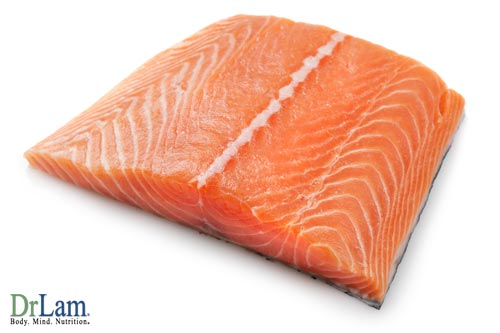 A new German study has shown that fish allergens are species-specific and that one can be allergic to a certain fish like Nile perch but not allergic to another fish such as Atlantic cod.
A new German study has shown that fish allergens are species-specific and that one can be allergic to a certain fish like Nile perch but not allergic to another fish such as Atlantic cod.
The new study on fish allergens was led by Dr. Janina Tomm from Helmholtz Centre for Environmental Research and other scientists from the University of Leipzig and the Haukeland University Hospital in Bergen and the study findings were published in the Journal of Investigational Allergology and Clinical Immunology. The study's conclusion was that "identification of species-specific allergens and individual sensitization could help us to improve avoidance strategies."
Fish has always been an important source of dietary protein as it has a total protein content of 15 to 25 % and it is a main component of the diet especially in coastal areas. Edible fish include more than 20,000 species and the world average fish consumption per year has constantly been increasing in the past few years. The rising supply and demand for seafood is therefore associated with an increased risk of fish allergies.
Allergy to fish represents one of the most prevalent causes for severe food-allergic reactions. The prevalence of fish allergy is estimated to 0.1 % - 0.3 % of the total population in industrialized countries. When the body misidentifies the proteins in fish as dangerous, it sends out an antibody called immunoglobulin E (IgE) to attack the invading fish allergen. The IgE antibody in turn releases other chemicals to combat the fish protein and the body reacts negatively to such chemicals that are circulating through the body by displaying various allergic symptoms which include eczema, hives, swelling, vomiting, nausea and diarrhea.
A few milligram of fish can be sufficient to provoke allergic reactions in individuals with hypersensitivity to fish allergens. The minimum dose amounts needed to elicit symptoms were reported in the range between 5 to 6000 mg of fish consumed.
In the new study, scientists studied the proteins from the Kuruma shrimp (Marsupenaeus japonicus) and they were able to identify two new enzymes, pyruvate kinase and phosphopyruvate hydratase, which they believe may be the cause of food allergies to shellfish.
The most common allergen in fish and crustaceans is parvalbumin, a calcium-binding albumin protein which is highly water-soluble and resistant to heat, denaturing agents and extreme pH.
Salmon, tuna and halibut are the most common kinds of finned fish to which people are allergic according to the Food Allergy Research & Education. More than half of all people who are allergic to one type of fish also are allergic to other fish, so allergists often advise their fish-allergic patients to avoid all fish.
The new study has shown that fish allergies are much more fish allergen specific than previously assumed and that in the future, more precise allergy diagnostic tests may be developed to allow fish allergy sufferers more freedom of food choice by allowing them to identify a fish that they can eat without triggering an allergic reaction.
 Research at Ohio State University has shown even slight stress can exacerbate the symptoms of allergies. Interestingly, this increase in experience of symptoms seems to be greater the second day after appearance of symptoms. The anxiety related to stress plays a significant part. This finding is important because allergies are the fifth most common disease in the United States. Next day increases in symptoms indicate a continuing reaction that gains in strength. It also suggests that allergy sufferers may then react strongly to still other substances they hadn’t shown symptoms to previously. One of the investigators also said that these later allergy symptoms usually don’t respond to the most common treatments, such as antihistamines. This research indicates allergy symptoms can lead to stress and anxiety which then increases the negative effects of the allergen in a downward spiral of significant symptoms.The inescapable fact of stress in our society today makes this research important.
Research at Ohio State University has shown even slight stress can exacerbate the symptoms of allergies. Interestingly, this increase in experience of symptoms seems to be greater the second day after appearance of symptoms. The anxiety related to stress plays a significant part. This finding is important because allergies are the fifth most common disease in the United States. Next day increases in symptoms indicate a continuing reaction that gains in strength. It also suggests that allergy sufferers may then react strongly to still other substances they hadn’t shown symptoms to previously. One of the investigators also said that these later allergy symptoms usually don’t respond to the most common treatments, such as antihistamines. This research indicates allergy symptoms can lead to stress and anxiety which then increases the negative effects of the allergen in a downward spiral of significant symptoms.The inescapable fact of stress in our society today makes this research important.
All sources of stress lead to the same bodily reaction. The hypothalamic-pituitary-adrenal (HPA) axis is set in motion, ultimately stimulating the adrenal glands to release cortisol to fight the effects of stress. If stress continues, the demand on the adrenals increases, eventually resulting in adrenal fatigue when these glands are depleted. At that time, a set of vague symptoms begin making themselves known. Among these symptoms is anxiety. The presence of anxiety can exacerbate the experience of allergy symptoms, as shown above.
In order to successfully treat these symptoms of adrenal fatigue, a new way of viewing how our bodies respond to stress is needed. Traditionally, physicians treat individual organs and/or symptoms. This approach neglects how the various systems in our bodies interact when under stress. It leads to less than optimal treatment. The NeuroEndoMetabolic model is more comprehensive and leads to more successful treatment of stress, thereby lessening the experience of allergy symptoms.

